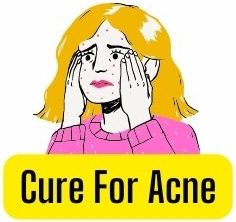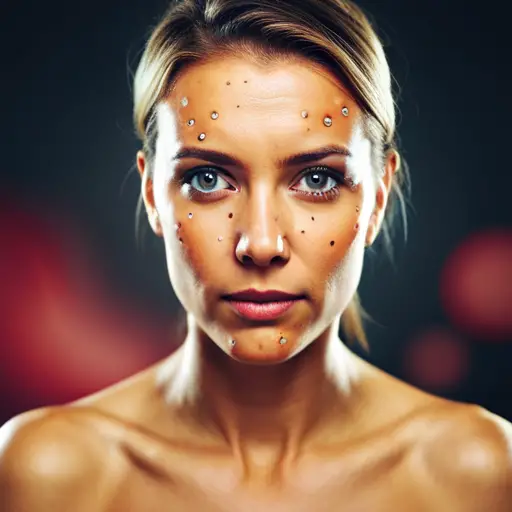The relationship between stress and skin health has been a subject of interest for researchers and dermatologists alike, as the intricate connection between psychological well-being and physiological manifestations becomes increasingly evident.
Hormonal acne, in particular, is a common skin concern that has been linked to stress levels, with numerous studies highlighting the role of cortisol – the primary stress hormone – in exacerbating acne breakouts.
Understanding this complex interplay between stress and hormonal acne is crucial for individuals seeking freedom from persistent skin issues, as it enables them to identify potential triggers and implement effective management strategies.
In order to effectively address hormonal acne, it is essential to first comprehend the various factors that contribute to its development.
This article aims to provide an evidence-based overview of common stressors leading to hormonal acne, along with guidance on identifying personal acne triggers.
Furthermore, practical tips for managing both stress and hormonal acne will be discussed, followed by an exploration of treatment options available for those struggling with this prevalent skin condition.
By gaining insight into these aspects of hormonal acne management, individuals can take proactive steps towards achieving healthier skin while simultaneously improving their overall well-being.
Key Takeaways
– Hormonal acne is heavily influenced by stress levels, with cortisol exacerbating breakouts.
– Identifying personal acne triggers is crucial for effective management, which can be done through keeping a daily journal.
– Self-care practices like regular exercise, mindfulness, and an acne prevention diet can reduce stress levels and promote a healthier skin environment.
– Effective skincare routines, including over-the-counter remedies and professional dermatological treatments, can help combat hormonal acne triggers, but lifestyle modifications like stress management and diet adjustments are also important for alleviating symptoms.
Understanding the Stress-Hormone Connection
Delving into the intricate stress-hormone connection unveils crucial insights on how hormonal fluctuations exacerbate acne breakouts, necessitating a comprehensive approach to skin care.
The influence of stress on hormone production is primarily through the hypothalamic-pituitary-adrenal (HPA) axis, which regulates essential functions such as digestion, immune response, and energy storage.
When experiencing stress, the body releases cortisol and other hormones that can stimulate oil gland secretion and lead to acne flare-ups.
Consequently, incorporating stress reduction techniques becomes paramount for maintaining healthy skin.
Increasing evidence supports the efficacy of hormone balancing diets in managing hormonal acne.
These diets focus on consuming nutrient-dense foods that aid in regulating insulin levels and reducing inflammation—two factors that contribute significantly to hormonal imbalances and subsequently cause acne breakouts.
Additionally, incorporating practices like mindfulness meditation or yoga alongside dietary modifications have been shown to enhance overall well-being by reducing stress levels and promoting optimal hormonal balance.
Ultimately, adopting a holistic approach that combines diet optimization with adequate stress management strategies can effectively mitigate the detrimental impact of stress-induced hormonal fluctuations on one’s skin health while fostering an enduring sense of freedom from breakouts.
Common Stressors Leading to Hormonal Acne
Examining the various factors contributing to hormonal acne, common stressors include emotional turmoil, sleep deprivation, poor diet choices, and environmental pollutants.
Emotional stress can negatively impact mental health, leading to increased cortisol levels that may exacerbate acne breakouts.
Sleep deprivation further elevates these stress hormones while also reducing the skin’s ability to repair itself during the night.
Poor dietary habits can intensify inflammation and contribute to hormonal imbalances that trigger acne formation.
Additionally, exposure to environmental pollutants can clog pores and disrupt the skin’s natural barrier function, making it more susceptible to breakouts.
To mitigate the effects of these common stressors on one’s complexion, it is crucial for individuals experiencing hormonal acne to prioritize self-care and establish effective skincare routines.
This may include practicing relaxation techniques such as meditation or yoga in order to maintain emotional well-being; ensuring adequate sleep each night for proper skin repair; adopting a balanced diet rich in anti-inflammatory foods like fruits, vegetables, whole grains, and lean protein sources; as well as utilizing appropriate skincare products designed for one’s specific skin type and needs.
Furthermore, protecting one’s skin from harmful environmental factors by incorporating sunscreen into daily regimens and avoiding excessive exposure to pollution can also contribute significantly towards achieving clearer skin despite ongoing stressors in one’s life.
Identifying Your Personal Acne Triggers
Understanding the specific factors that provoke acne flare-ups is essential in formulating a personalized and effective skincare regimen to combat breakouts and maintain a healthy complexion. Identifying one’s personal acne triggers may require some detective work, as each individual’s skin reacts differently to various stressors.
It is crucial to pay close attention to patterns and changes in lifestyle, diet, or emotional well-being that may coincide with periods of increased acne activity.
Implementing acne prevention strategies can help reduce the frequency and severity of hormonal breakouts.
– Keep a daily journal to track food intake, stress levels, and skincare routines
– Observe correlations between certain foods or activities and subsequent breakout occurrences
– Consider potential emotional triggers such as relationship issues, work-related stress, or significant life events
– Consult with a dermatologist or healthcare professional for guidance on identifying unique triggers
– Experiment with eliminating suspected culprits from one’s routine or diet while monitoring any improvements in skin condition
By understanding these individualized factors contributing to hormonal acne flare-ups, an informed approach can be taken towards implementing effective prevention strategies.
This could include making dietary modifications, practicing stress management techniques such as meditation or exercise, addressing emotional triggers through therapy or support networks if necessary, and using appropriate skincare products tailored to unique skin conditions.
In doing so, individuals can take control over their skin health while also benefiting from an overall sense of freedom by proactively managing their well-being.
Tips for Managing Stress and Hormonal Acne
Effectively managing anxiety and its impact on hormonal breakouts requires a multifaceted approach, encompassing lifestyle modifications, self-care practices, and tailored skincare routines to promote overall well-being and healthy complexion.
To achieve this balance, individuals should incorporate stress relief techniques into their daily routine as well as adopt an acne prevention diet to minimize the likelihood of experiencing hormonal acne flare-ups.
A combination of physical activity, mindfulness exercises, and balanced nutrition can significantly reduce stress levels while also promoting a healthier skin environment.
Incorporating regular exercise into one’s schedule has been shown to alleviate stress by releasing endorphins that improve mood and decrease anxiety levels.
Additionally, practicing mindfulness activities such as meditation or yoga can help cultivate a sense of calmness in both the body and mind.
An acne prevention diet should include foods rich in antioxidants, omega-3 fatty acids, vitamins A & E, zinc, and selenium which have anti-inflammatory properties that may contribute to clearer skin. Below is a table outlining some beneficial activities for combating stress-induced hormonal acne:
| Stress Relief TechniquesAcne Prevention Diet——————————————————Exercise (e.g., walking)Foods high in antioxidants (e.g., berries)Mindfulness (e.g., meditation)Omega-3 fatty acids (e.g., fish or walnuts)Adequate sleepVitamins A & E (e.g., leafy greens or almonds) |
|---|
By integrating these techniques into daily routines alongside maintaining an effective skincare regimen tailored to individual needs, individuals can better manage their stress levels while simultaneously working towards preventing hormone-driven breakouts.
Ultimately, achieving an equilibrium between mental health management and targeted skincare practices will result in a healthier complexion free from the detrimental effects of persistent anxiety.
Treatment Options for Hormonal Acne
Exploring treatment options for hormonal acne is essential in managing this prevalent skin condition that affects a significant number of individuals.
Over-the-counter solutions, such as topical creams and cleansers containing salicylic acid or benzoyl peroxide, may provide relief for mild to moderate cases.
However, professional dermatological treatments, including prescription medications and hormone therapy, are often necessary for more severe cases or when over-the-counter remedies prove ineffective in alleviating symptoms.
Over-the-counter solutions
Numerous over-the-counter remedies, such as benzoyl peroxide and salicylic acid, can be employed to combat hormonal acne triggers, providing a veritable panacea for those seeking relief from this vexing epidermal malady.
The over-the-counter effectiveness of these treatments largely depends on the severity of the acne and individual skin types; however, many individuals find success with consistent use in tandem with an appropriate skincare regimen.
Topical product recommendations frequently include cleansers, spot treatments, and moisturizers containing active ingredients such as benzoyl peroxide or salicylic acid aimed at unclogging pores and reducing inflammation.
In addition to these popular options, other over-the-counter solutions comprise alpha hydroxy acids (AHAs), beta hydroxy acids (BHAs), retinoids, and sulfur-based products.
These components work through various mechanisms to exfoliate dead skin cells, promote cell turnover, reduce sebum production, or inhibit bacterial growth associated with acne development.
While self-treatment is often the first step in addressing hormonal acne triggers, it is crucial to remember that patience is required when waiting for visible results.
In some cases where over-the-counter methods prove insufficient or exacerbate symptoms due to adverse reactions or improper usage, consultation with a dermatologist may be necessary for more targeted treatment plans tailored to individual needs.
Professional dermatological treatments
Transitioning from over-the-counter solutions, it is crucial to consider professional dermatological treatments when addressing the complex relationship between stress and hormonal acne triggers.
Seeking assistance from a certified dermatologist can provide tailored recommendations based on individual skin types, severity of acne, and specific needs.
By incorporating expert advice into daily skincare routines, individuals can significantly enhance their chances of successfully combating stress-induced hormonal acne.
Dermatologist recommendations often include a combination of topical treatments, oral medications, and lifestyle modifications.
These healthcare professionals possess comprehensive knowledge about various treatments’ efficacy and potential side effects, ensuring that patients receive the most suitable options for their unique circumstances.
To better understand the scope of available professional interventions for hormonal acne triggered by stress, consider the following:
– Topical Treatments:
- Prescription-strength retinoids (e.g., tretinoin)
- Antibiotics (e.g., clindamycin)
- Azelaic acid
– Oral Medications:
- Hormonal therapies (e.g., birth control pills)
- Anti-androgen agents (e.g., spironolactone)
- Oral antibiotics (e.g., doxycycline)
– Lifestyle Modifications:
- Stress management techniques
- Diet adjustments to reduce inflammation
- Adherence to a consistent skincare routine
Incorporating these dermatologist-recommended strategies into one’s daily life can be pivotal in achieving clearer skin while simultaneously promoting overall well-being.
By seeking professional guidance and establishing effective skincare routines tailored to individual needs, those suffering from stress-induced hormonal acne can experience significant improvements in both their complexion and quality of life.
Frequently Asked Questions
How does hormonal acne differ from other types of acne in terms of symptoms and appearance?
Hormonal acne, primarily attributed to hormonal imbalance symptoms, often presents as deep, painful cysts predominantly around the chin and jawline. In comparison, other acne types may exhibit milder inflammation and superficial blemishes.
Can certain foods or dietary habits contribute to hormonal acne flare-ups?
Navigating the landscape of hormonal acne flare-ups, dietary inflammation and sugar intake emerge as potential culprits. Research suggests that consuming foods with high glycemic index may exacerbate hormone-related skin conditions.
How do stress hormones specifically affect the sebaceous glands to cause hormonal acne?
Stress management plays a crucial role in sebaceous gland regulation, as stress hormones, specifically cortisol, increase sebum production and inflammation, consequently leading to the development of hormonal acne.
Are there any specific skincare products or ingredients that can help prevent or treat hormonal acne caused by stress?
In a world overflowing with skincare ingredients, prevention techniques targeting hormonal acne caused by stress are vital. Evidence-based approaches recommend incorporating salicylic acid, benzoyl peroxide, and retinoids for optimal skin liberation.
Can hormonal acne caused by stress occur at any age, or is it more common during certain life stages?
Hormonal acne may manifest at any life stage, though prevalence varies. Stress management techniques are crucial for mitigating hormonal imbalances that exacerbate acne. Implementing such strategies promotes skin health and overall well-being.
Conclusion
In summary, stress stands as a significant source of skin strife, specifically in the sphere of hormonal acne. Substantial strides should be taken to subdue stress and safeguard skin health against acne afflictions.
Through thorough tracking and targeted treatment tactics, triumph over troublesome hormonal acne can be attained. Ascertaining individual triggers and adopting appropriate stress management methods remain crucial components in controlling this common complexion concern.





